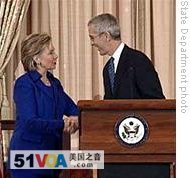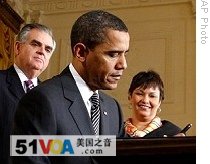State Department
26 January 2009
 |
| Secretary of State Hillary Clinton (l) and Todd Stern, Special Envoy for Climate Change at the State Department in Washington, 26 Jan 2009 |
One of the Bush administration's first acts on the environment, in 2001, was to withdraw from the Kyoto Protocol that aimed to slow global warning by curbing greenhouse gas emissions.
Now the Obama administration, in a break with its predecessor, has appointed a key U.S. negotiator for the Kyoto treaty, Todd Stern, to lead a reinvigorated U.S. role in international climate change negotiations.
 |
| President Barack Obama, flanked by Transportation Secretary Ray LaHood, left, and EPA Administrator Lisa Jackson, signs executive order dealing with energy independence and climate change, 26 Jan. 2009 |
Secretary of State Hillary Clinton said the evidence of global warming due to carbon emissions can no longer be doubted.
"The urgency of the global climate crisis must not be underestimated," she said. "Nor should the science behind it or the facts on the ground be ignored or dismissed. The time for realism and action is now. And President Obama and I recognize that the solutions to this crisis are both domestic and global, that all nations bear responsibility and all nations must work together to find solutions."
Clinton said American leadership is essential to meeting the challenges of the 21st century and that climate change is chief among them. She said the nomination of Sterns as special envoy sends an "unmistakable message" that the United States will be energetic, focused and serious in dealing with global warning and the corollary issue of clean energy.
Stern, after his environmental role in the Bill Clinton White House, taught at Harvard University and worked on climate change issues as an analyst for the Center for American Progress in Washington.
He said the time for delay and dispute over climate change is over and that effective U.S. action must begin at home.
"As the largest historic emitter of greenhouse gases, we can only expect to lead abroad if we are prepared to act decisively at home," he said. "Yet we can only meet the climate challenge with a response that is genuinely global. Eighty percent of greenhouse gas emissions are produced outside the United States. And a rapidly growing percentage is produced in emerging market countries."
Clinton administration Vice President Al Gore signed the Kyoto Protocol. But the treaty was never submitted for Senate ratification, with the Bush White House contending it unfairly restricted U.S. emissions while exempting key developing nations like India and China.
There was no indication the Stern nomination means a U.S. effort to rejoin or renegotiate the Kyoto treaty. But the new envoy will be the chief U.S. delegate at the next United Nations climate summit at the end of this year in Copenhagen that will seek a new climate change agreement.